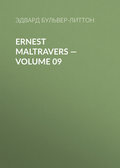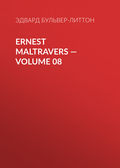
Эдвард Бульвер-Литтон
«My Novel» – Volume 03
CHAPTER XIII
Whatever, may be the ultimate success of Miss Jemima Hazeldean's designs upon Dr. Riccabocca, the Machiavellian sagacity with which the Italian had counted upon securing the services of Lenny Fairfield was speedily and triumphantly established by the result. No voice of the parson's, charmed he ever so wisely, could persuade the peasant-boy to go and ask pardon of the young gentleman, to whom, because he had done as he was bid, he owed an agonizing defeat and a shameful incarceration; and, to Mrs. Dale's vexation, the widow took the boy's part. She was deeply offended at the unjust disgrace Lenny had undergone in being put in the stocks; she shared his pride, and openly approved his spirit. Nor was it without great difficulty that Lenny could be induced to resume his lessons at school,—nay, even to set foot beyond the precincts of his mother's holding. The point of the school at last he yielded, though sullenly; and the parson thought it better to temporize as to the more unpalatable demand. Unluckily, Lenny's apprehensions of the mockery that awaited him in the merciless world of his village were realized. Though Stirn at first kept his own counsel the tinker blabbed the whole affair. And after the search instituted for Lenny on the fatal night, all attempt to hush up what had passed would have been impossible. So then Stirn told his story, as the tinker had told his own; both tales were very unfavourable to Leonard Fairfield. The pattern-boy had broken the Sabbath, fought with his betters, and been well mauled into the bargain; the village lad had sided with Stirn and the authorities in spying out the misdemeanours of his equals therefore Leonard Fairfield, in both capacities of degraded pattern-boy and baffled spy, could expect no mercy,—he was ridiculed in the one, and hated in the other.
It is true that, in the presence of the schoolmaster and under the eye of Mr. Dale, no one openly gave vent to malignant feelings; but the moment those checks were removed, popular persecution bcgan.
Some pointed and mowed at him, some cursed him for a sneak, and all shunned his society; voices were heard in the hedgerows, as he passed through the village at dusk, "Who was put into the stocks?—baa!" "Who got a bloody nob for playing spy to Nick Stirn?—baa!" To resist this species of aggression would have been a vain attempt for a wiser head and a colder temper than our poor pattern-boy's. He took his resolution at once, and his mother approved it; and the second or third day after Dr. Riccabocca's return to the Casino, Lenny Fairfield presented himself on the terrace with a little bundle in his hand. "Please, sir," said he to the doctor, who was sitting cross-legged on the balustrade, with his red silk umbrella over his head,—"please, sir, if you'll be good enough to take me now, and give me any hole to sleep in, I'll work for your honour night and day; and as for wages, Mother says, 'just suit yourself, sir.'"
"My child," said the doctor, taking Lenny by the hand, and looking at him with the sagacious eye of a wizard, "I knew you would come! and Giacomo is already prepared for you! As to wages, we'll talk of them by and by."
Lenny being thus settled, his mother looked for some evenings on the vacant chair, where he had so long sat in the place of her beloved Mark; and the chair seemed so comfortless and desolate, thus left all to itself, that she could bear it no longer.
Indeed the village had grown as distasteful to her as to Lenny,—perhaps more so; and one morning she hailed the steward as he was trotting his hog-maued cob beside the door, and bade him tell the squire that "she would take it very kind if he would let her off the six months' notice for the land and premises she held; there were plenty to step into the place at a much better rent."
"You're a fool," said the good-natured steward; "and I'm very glad you did not speak to that fellow Stirn instead of to me. You've been doing extremely well here, and have the place, I may say, for nothing."
"Nothin' as to rent, sir, but a great deal as to feelin'," said the widow. "And now Lenny has gone to work with the foreign gentleman, I should like to go and live near him."
"Ah, yes, I heard Lenny had taken himself off to the Casino, more fool he; but, bless your heart, 't is no distance,—two miles or so. Can't he come home every night after work?"
"No, sir," exclaimed the widow, almost fiercely; "he sha'n't come home here, to be called bad names and jeered at!—he whom my dead good man was so fond and proud of. No, sir; we poor folks have our feelings, as I said to Mrs. Dale, and as I will say to the squire hisself. Not that I don't thank him for all favours,—he be a good gentleman if let alone; but he says he won't come near us till Lenny goes and axes pardin. Pardin for what, I should like to know? Poor lamb! I wish you could ha' seen his nose, sir,—as big as your two fists. Ax pardin! if the squire had had such a nose as that, I don't think it's pardin he'd been ha' axing. But I let the passion get the better of me,—I humbly beg you'll excuse it, sir. I'm no schollard, as poor Mark was, and Lenny would have been, if the Lord had not visited us otherways. Therefore just get the squire to let me go as soon as may be; and as for the bit o' hay and what's on the grounds and orchard, the new comer will no doubt settle that."
The steward, finding no eloquence of his could induce the widow to relinquish her resolution, took her message to the squire. Mr. Hazeldean, who was indeed really offended at the boy's obstinate refusal to make the /amende honorable/ to Randal Leslie, at first only bestowed a hearty curse or two on the pride and ingratitude both of mother and son. It may be supposed, however, that his second thoughts were more gentle, since that evening, though he did not go himself to the widow, he sent his "Harry." Now, though Harry was sometimes austere and brusque enough on her own account, and in such business as might especially be transacted between herself and the cottagers, yet she never appeared as the delegate of her lord except in the capacity of a herald of peace and mediating angel. It was with good heart, too, that she undertook this mission, since, as we have seen, both mother and son were great favourites of hers. She entered the cottage with the friendliest beam in her bright blue eye, and it was with the softest tone of her frank cordial voice that she accosted the widow. But she was no more successful than the steward had been. The truth is, that I don't believe the haughtiest duke in the three kingdoms is really so proud as your plain English rural peasant, nor half so hard to propitiate and deal with when his sense of dignity is ruffled. Nor are there many of my own literary brethren (thin-skinned creatures though we are) so sensitively alive to the Public Opinion, wisely despised by Dr. Riccabocca, as that same peasant. He can endure a good deal of contumely sometimes, it is true, from his superiors (though, thank Heaven! that he rarely meets with unjustly); but to be looked down upon and mocked and pointed at by his own equals—his own little world—cuts him to the soul. And if you can succeed in breaking this pride and destroying this sensitiveness, then he is a lost being. He can never recover his self-esteem, and you have chucked him half-way—a stolid, inert, sullen victim—to the perdition of the prison or the convict-ship.
Of this stuff was the nature both of the widow and her son. Had the honey of Plato flowed from the tongue of Mrs. Hazeldean, it could not have turned into sweetness the bitter spirit upon which it descended. But Mrs. Hazeldean, though an excellent woman, was rather a bluff, plain- spoken one; and after all she had some little feeling for the son of a gentleman, and a decayed, fallen gentleman, who, even by Lenny's account, had been assailed without any intelligible provocation; nor could she, with her strong common-sense, attach all the importance which Mrs. Fairfield did to the unmannerly impertinence of a few young cubs, which she said truly, "would soon die away if no notice was taken of it." The widow's mind was made up, and Mrs. Hazeldean departed,—with much chagrin and some displeasure.
Mrs. Fairfield, however, tacitly understood that the request she had made was granted, and early one morning her door was found locked, the key left at a neighbour's to be given to the steward; and, on further inquiry, it was ascertained that her furniture and effects had been removed by the errand cart in the dead of the night. Lenny had succeeded in finding a cottage on the road-side, not far from the Casino; and there, with a joyous face, he waited to welcome his mother to breakfast, and show how he had spent the night in arranging her furniture.
"Parson!" cried the squire, when all this news came upon him, as he was walking arm in arm with Mr. Dale to inspect some proposed improvement in the Almshouse, "this is all your fault. Why did you not go and talk to that brute of a boy and that dolt of a woman? You've got 'soft sawder enough,' as Frank calls it in his new-fashioned slang."
"As if I had not talked myself hoarse to both!" said the parson, in a tone of reproachful surprise at the accusation. "But it was in vain! O Squire, if you had taken my advice about the stocks,—'quieta non movere'!"
"Bother!" said the squire. "I suppose I am to be held up as a tyrant, a Nero, a Richard the Third, or a Grand Inquisitor, merely for having things smart and tidy! Stocks indeed! Your friend Rickeybockey said he was never more comfortable in his life,—quite enjoyed sitting there. And what did not hurt Rickeybockey's dignity (a very gentlemanlike man he is, when he pleases) ought to be no such great matter to Master Leonard Fairfield. But 't is no use talking! What's to be done now? The woman must not starve; and I'm sure she can't live out of Rickeybockey's wages to Lenny,—by the way, I hope he don't board the boy upon his and Jackeymo's leavings: I hear they dine upon newts and sticklebacks, faugh! I'll tell you what, Parson, now I think of it, at the back of the cottage which she has taken there are some fields of capital land just vacant. Rickeybockey wants to have 'em, and sounded me as to the rent when he was at the Hall. I only half promised him the refusal. And he must give up four or five acres of the best land round the cottage to the widow—just enough for her to manage—and she can keep a dairy. If she want capital, I'll lend her some in your name,—only don't tell Stirn; and as for the rent—we'll talk of that when we see how she gets on, thankless, obstinate jade that she is! You see," added the squire, as if he felt there was some apology due for this generosity to an object whom he professed to consider so ungrateful, "her husband was a faithful servant, and so—I wish you would not stand there staring me out of countenance, but go down to the woman at once, or Stirn will have let the land to Rickeybockey, as sure as a gun. And hark ye, Dale, perhaps you can contrive, if the woman is so cursedly stiffbacked, not to say the land is mine, or that it is any favour I want to do her—or, in short, manage it as you can for the best." Still even this charitable message failed. The widow knew that the land was the squire's, and worth a good L3 an acre. "She thanked him humbly for that and all favours; but she could not afford to buy cows, and she did not wish to be beholden to any one for her living. And Lenny was well off at Mr. Rickeybockey's, and coming on wonderfully in the garden way, and she did not doubt she could get some washing; at all events, her haystack would bring in a good bit of money, and she should do nicely, thank their honours."
Nothing further could be done in the direct way, but the remark about the washing suggested some mode of indirectly benefiting the widow; and a little time afterwards, the sole laundress in that immediate neighbourhood happening to die, a hint from the squire obtained from the landlady of the inn opposite the Casino such custom as she had to bestow, which at times was not inconsiderable. And what with Lenny's wages (whatever that mysterious item might be), the mother and son contrived to live without exhibiting any of those physical signs of fast and abstinence which Riccabocca and his valet gratuitously afforded to the student in animal anatomy.
CHAPTER XIV
Of all the wares and commodities in exchange and barter, wherein so mainly consists the civilization of our modern world, there is not one which is so carefully weighed, so accurately measured, so plumbed and gauged, so doled and scraped, so poured out in minima and balanced with scruples,—as that necessary of social commerce called "an apology"! If the chemists were half so careful in vending their poisons, there would be a notable diminution in the yearly average of victims to arsenic and oxalic acid. But, alas! in the matter of apology, it is not from the excess of the dose, but the timid, niggardly, miserly manner in which it is dispensed, that poor Humanity is hurried off to the Styx! How many times does a life depend on the exact proportions of an apology! Is it a hairbreadth too short to cover the scratch for which you want it? Make your will,—you are a dead man! A life do I say?—a hecatomb of lives! How many wars would have been prevented, how many thrones would be standing, dynasties flourishing, commonwealths brawling round a /bema/, or fitting out galleys for corn and cotton, if an inch or two more of apology had been added to the proffered ell! But then that plaguy, jealous, suspicious, old vinegar-faced Honour, and her partner Pride—as penny-wise and pound-foolish a she-skinflint as herself—have the monopoly of the article. And what with the time they lose in adjusting their spectacles, hunting in the precise shelf for the precise quality demanded, then (quality found) the haggling as to quantum,—considering whether it should be Apothecary's weight or Avoirdupois, or English measure or Flemish,—and, finally, the hullabuloo they make if the customer is not perfectly satisfied with the monstrous little he gets for his money, I don't wonder, for my part, how one loses temper and patience, and sends Pride, Honour, and Apology all to the devil. Aristophanes, in his comedy of "Peace," insinuates a beautiful allegory by only suffering that goddess, though in fact she is his heroine, to appear as a mute. She takes care never to open her lips. The shrewd Greek knew very well that she would cease to be Peace, if she once began to chatter. Wherefore, O reader, if ever you find your pump under the iron heel of another man's boot, Heaven grant that you may hold your tongue, and not make things past all endurance and forgiveness by bawling out for an apology!
CHAPTER XV
But the squire and his son, Frank, were large-hearted generous creatures in the article of apology, as in all things less skimpingly dealt out. And seeing that Leonard Fairfield would offer no plaster to Randal Leslie, they made amends for his stinginess by their own prodigality. The squire accompanied his son to Rood Hall, and none of the family choosing to be at home, the squire in his own hand, and from his own head, indited and composed an epistle which might have satisfied all the wounds which the dignity of the Leslies had ever received.
This letter of apology ended with a hearty request that Randal would come and spend a few days with his son. Frank's epistle was to the same purport, only more Etonian and less legible.
It was some days before Randal's replies to these epistles were received. The replies bore the address of a village near London; and stated that the writer was now reading with a tutor preparatory to entrance to Oxford, and could not, therefore, accept the invitation extended to him.
For the rest, Randal expressed himself with good sense, though not with much generosity. He excused his participation in the vulgarity of such a conflict by a bitter, but short allusion to the obstinacy and ignorance of the village boor; and did not do what you, my kind reader, certainly would have done under similar circumstances,—namely, intercede in behalf of a brave and unfortunate antagonist. Most of us like a foe better after we have fought him,—that is, if we are the conquering party; this was not the case with Randal Leslie. There, so far as the Etonian was concerned, the matter rested. And the squire, irritated that he could not repair whatever wrong that young gentleman had sustained, no longer felt a pang of regret as he passed by Mrs. Fairfield's deserted cottage.
CHAPTER XVl
Lenny Fairfield continued to give great satisfaction to his new employers, and to profit in many respects by the familiar kindness with which he was treated. Riccabocca, who valued himself on penetrating into character, had from the first seen that much stuff of no common quality and texture was to be found in the disposition and mind of the English village boy. On further acquaintance, he perceived that, under a child's innocent simplicity, there were the workings of an acuteness that required but development and direction. He ascertained that the pattern- boy's progress at the village school proceeded from something more than mechanical docility and readiness of comprehension. Lenny had a keen thirst for knowledge, and through all the disadvantages of birth and circumstance, there were the indications of that natural genius which converts disadvantages themselves into stimulants. Still, with the germs of good qualities lay the embryos of those which, difficult to separate, and hard to destroy, often mar the produce of the soil. With a remarkable and generous pride in self-repute, there was some stubbornness; with great sensibility to kindness, there was also strong reluctance to forgive affront.
This mixed nature in an uncultivated peasant's breast interested Riccabocca, who, though long secluded from the commerce of mankind, still looked upon man as the most various and entertaining volume which philosophical research can explore. He soon accustomed the boy to the tone of a conversation generally subtle and suggestive; and Lenny's language and ideas became insensibly less rustic and more refined. Then Riccabocca selected from his library, small as it was, books that, though elementary, were of a higher cast than Lenny could have found within his reach at Hazeldean. Riccabocca knew the English language well,—better in grammar, construction, and genius than many a not ill-educated Englishman; for he had studied it with the minuteness with which a scholar studies a dead language, and amidst his collection he had many of the books which had formerly served him for that purpose. These were the first works he lent to Lenny. Meanwhile Jackeymo imparted to the boy many secrets in practical gardening and minute husbandry, for at that day farming in England (some favoured counties and estates excepted) was far below the nicety to which the art has been immemorially carried in the north of Italy,—where, indeed, you may travel for miles and miles as through a series of market-gardens; so that, all these things considered, Leonard Fairfield might be said to have made a change for the better. Yet, in truth, and looking below the surface, that might be fair matter of doubt. For the same reason which had induced the boy to fly his native village, he no longer repaired to the church of Hazeldean. The old intimate intercourse between him and the parson became necessarily suspended, or bounded to an occasional kindly visit from the latter,– visits which grew more rare and less familiar, as he found his former pupil in no want of his services, and wholly deaf to his mild entreaties to forget and forgive the past, and come at least to his old seat in the parish church. Lenny still went to church,—a church a long way off in another parish,—but the sermons did not do him the same good as Parson Dale's had done; and the clergyman, who had his own flock to attend to, did not condescend, as Parson Dale would have done, to explain what seemed obscure, and enforce what was profitable, in private talk, with that stray lamb from another's fold.
Now I question much if all Dr. Riccabocca's maxims, though they were often very moral and generally very wise, served to expand the peasant boy's native good qualities, and correct his bad, half so well as the few simple words, not at all indebted to Machiavelli, which Leonard had once reverently listened to when he stood by Mark's elbow-chair, yielded up for the moment to the good parson, worthy to sit in it; for Mr. Dale had a heart in which all the fatherless of the parish found their place. Nor was this loss of tender, intimate, spiritual lore so counterbalanced by the greater facilities for purely intellectual instruction as modern enlightenment might presume. For, without disputing the advantage of knowledge in a general way, knowledge, in itself, is not friendly to content. Its tendency, of course, is to increase the desires, to dissatisfy us with what is, in order to urge progress to what may be; and in that progress, what unnoticed martyrs among the many must fall baffled and crushed by the way! To how large a number will be given desires they will never realize, dissatisfaction of the lot from which they will never rise! Allons! one is viewing the dark side of the question. It is all the fault of that confounded Riccabocca, who has already caused Lenny Fairfield to lean gloomily on his spade, and, after looking round and seeing no one near him, groan out querulously,—"And am I born to dig a potato ground?"
Pardieu, my friend Lenny, if you live to be seventy, and ride in your carriage, and by the help of a dinner-pill digest a spoonful of curry, you may sigh to think what a relish there was in potatoes, roasted in ashes after you had digged them out of that ground with your own stout young hands. Dig on, Lenny Fairfield, dig on! Dr. Riccabocca will tell you that there was once an illustrious personage—[The Emperor Diocletian]—who made experience of two very different occupations,—one was ruling men, the other was planting cabbages; he thought planting cabbages much the pleasanter of the two!







